Hotels with indoor pools have been around for decades. But at the plush new Downtown L.A. Proper Hotel, there’s a 2,777-square-foot suite with its own indoor swimming pool, and it’s much bigger than the one on the roof shared by all guests.
Another suite has a enough room and height to play basketball — because it used to be a basketball court, back when the Renaissance Revival-style tower on Broadway was a private club for the city’s business elite that included athletic facilities, fine dining and rooms for overnight stays.
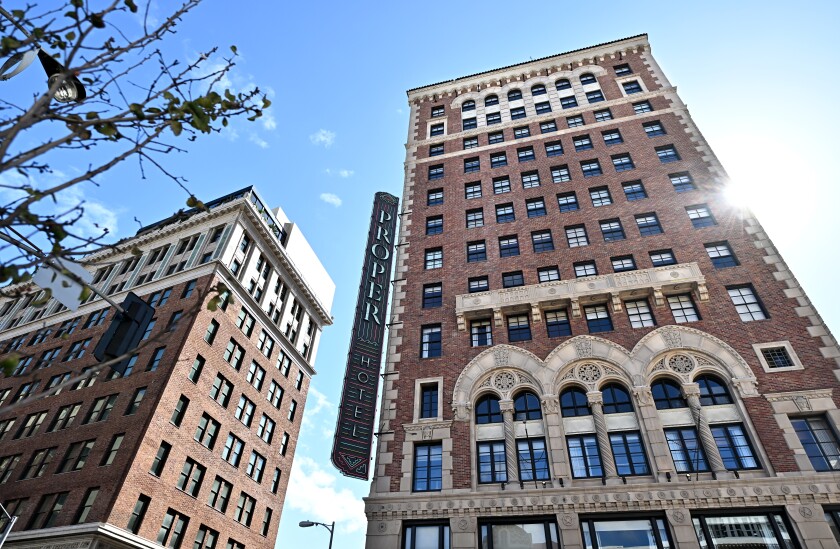
The Proper Hotel, seen from Broadway in downtown Los Angeles, recently opened in the face of hotel industry struggles.
(Wally Skalij / Los Angeles Times)
The building, completed in 1926 as the Commercial Club, has regained those elements after changing a lot over the years, usually not for the better. Now it’s owned by a Santa Monica company that specializes in large-scale makeovers of historic properties to create uncommon inns for travelers weary or wary of upmarket chain hotels.
“We call it a looser kind of luxury,” said Brian De Lowe, president of Proper Hospitality. “It’s our unique take” on deluxe urban hotels.
The company is calculating that the reviving South Broadway neighborhood where the Downtown L.A. Proper Hotel stands will keep improving. The location at Broadway and 11th Street is six blocks east of Crypto.com Arena and L.A. Live, on the edge of the Fashion District, South Park and the Historic Core.
Neighbors include the upscale Ace and Hoxton hotels, both created from brick-clad 1920s office towers. Across Broadway is the recently renovated Herald-Examiner building, completed in 1914 by newspaper titan William Randolph Hearst and now a branch of Arizona State University.
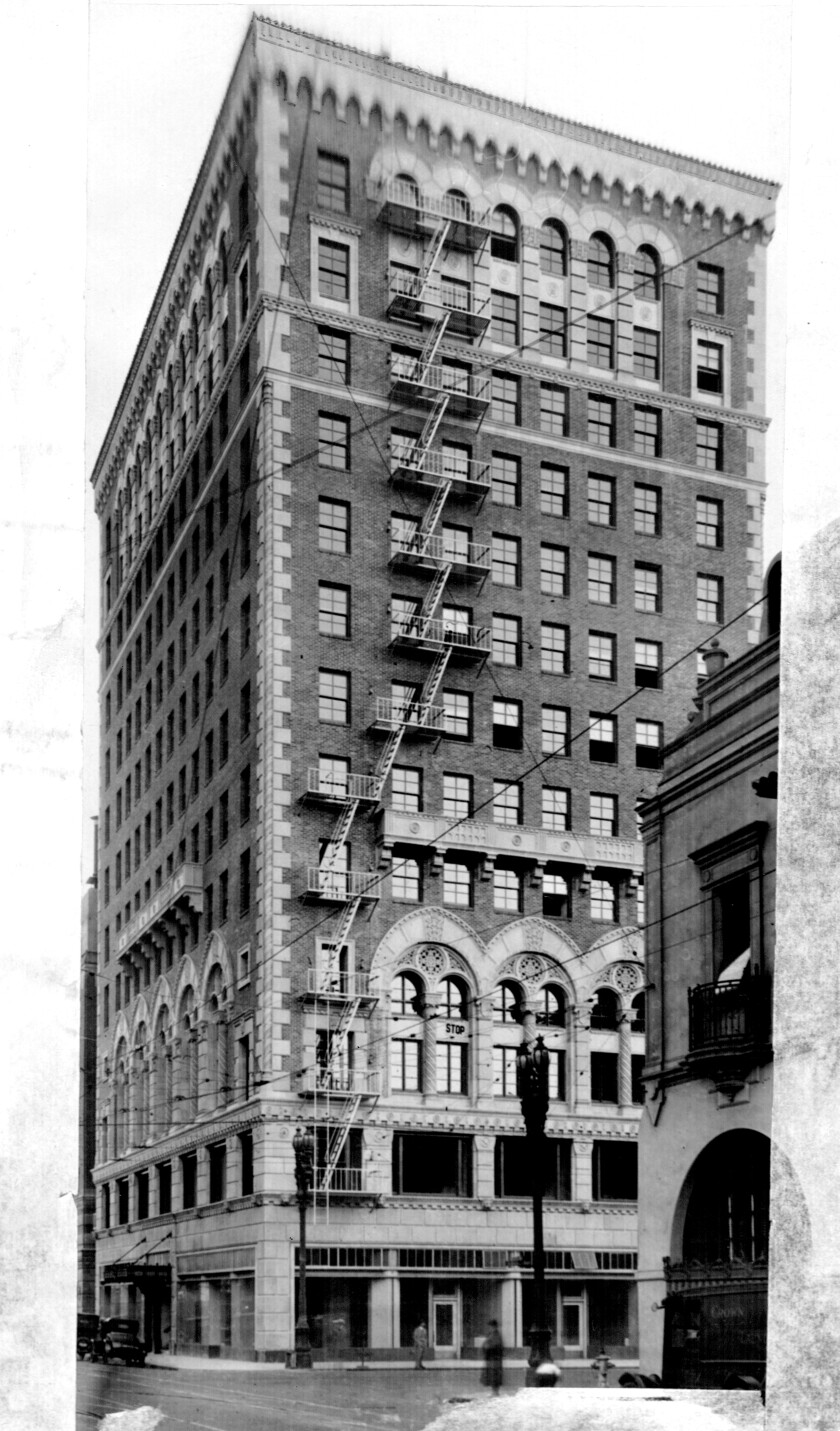
The Commercial Club of Southern California in downtown Los Angeles, Sept. 10, 1926.
(Los Angeles Examiner / USC Libraries / Corbis via Getty Images)
Proper Hospitality also is counting on a rebound of business and leisure travel from a pandemic plunge that decimated the ranks of hotels and restaurants.
Founded in 2015, the hospitality management company operates Proper hotels in Austin, Texas; San Francisco; and Santa Monica, where the 271-room inn includes a renovated 1920s office building linked by a bridge to a new seven-story addition. Proper Hospitality also manages six other hotels in Southern California, including Hotel June in Malibu, Venice V Hotel in Venice and Avalon Hotel & Bungalows Palm Springs.
It took about a decade to plan and build the Santa Monica hostelry, and the 148-room Downtown L.A. Proper Hotel was also several years in the making before opening in the fall amid a suffering hotel market.
The Commercial Club folded in the Great Depression. In 1941 the building was converted to a hotel, and that use continued until the YWCA Job Training Corps set up operations there in 1965. The YWCA moved to a new property several blocks away in early 2012, and the building stood vacant until the Proper arrived.
Remaking the 13-story building with a design by architect Omgivning cost more than $50 million as the owners labored to bring panache back to the once-glamorous structure.
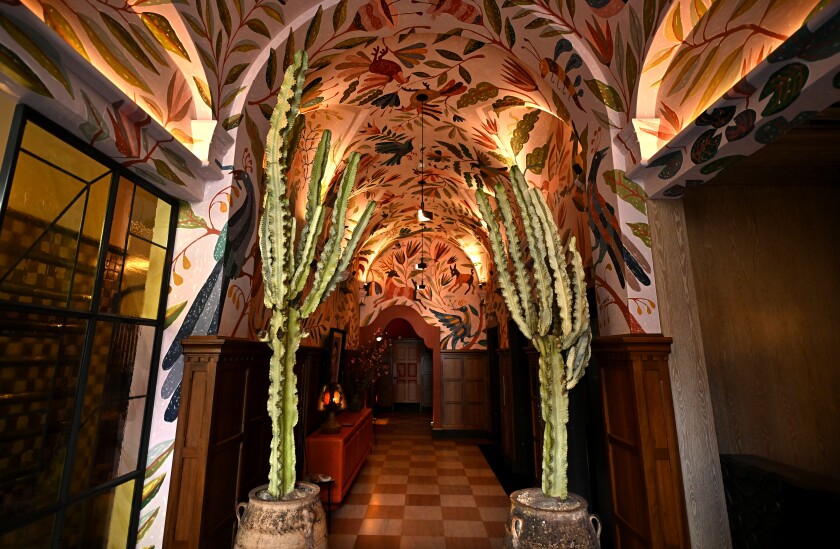
A view of the lobby at the Downtown L.A. Proper Hotel on Feb. 22.
(Wally Skalij / Los Angeles Times)
“Considering its massive scale, the Proper was a creative, space programming challenge that utilized every last square inch of the building,” said Morgan Sykes Jaybush, Omgivning’s director of hospitality projects.
The arbiter of Proper style is celebrity interior designer Kelly Wearstler, who was part of the rise of one-of-a-kind “design” hotels in the early 2000s such as the Viceroy Santa Monica. There, she joined her husband, developer Brad Korzen, and De Lowe as they turned a dog-eared 1960s inn near the beach into an upscale destination. Korzen and De Lowe went on to found Proper Hospitality, the hotel management company for their real estate firm Kor Group.
At the Proper, Wearstler didn’t hold back on the variety of textures, patterns and materials she is known for, layering in elements of Spanish, Portuguese, Mexican and Moroccan design. She brought in vintage furniture and rugs, which help make each room different. There are more than 100 kinds of hand-painted and custom tiles affixed throughout the property.
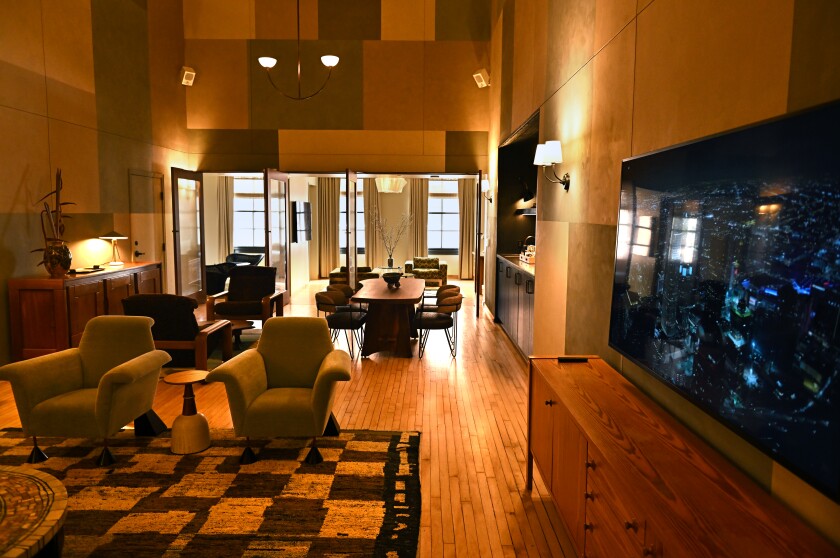
A view of the court suite at the Downtown L.A. Proper Hotel.
(Wally Skalij / Los Angeles Times)
In the 1,300-square-foot Basketball Suite, which retains its original wooden flooring, Wearstler opted to keep the double-height ceiling and painted color blocks on the wall to provide a more intimate sense of scale. A night there tips off at $5,000.
(Sorry, b-ball fans: No hoop. It’s one thing to evoke basketball; it’s another thing altogether to enable a board-pounding game that might disturb other guests.)
The seventh-floor Pool Suite provided the biggest challenge. The indoor “plunge,” as it was called in the 1920s, was 35 feet long and 12 feet deep, a proper companion to the club’s gymnasium and Turkish baths.
“It might have been easier to get rid of the pool entirely,” Wearstler said, “but I was really keen to see how we could make it work within the context of a guest suite.”
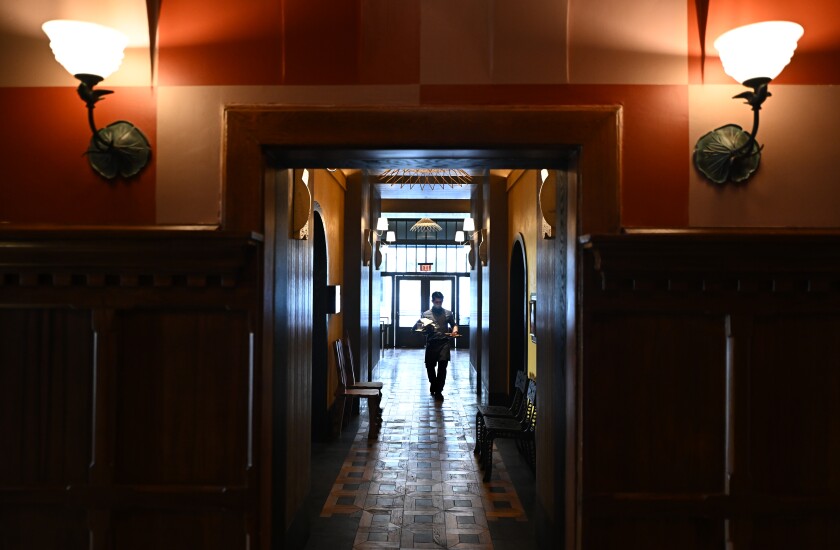
A view of a hallway at the downtown L.A. Proper Hotel.
(Wally Skalij / Los Angeles Times)
The pool level was reduced to nearly 4 feet to conform with modern safety standards. In addition to creating a suite with as many as two bedrooms and two-and-a-half bathrooms (the suite is expandable to the full 2,777 square feet, bigger than the average new single-family home), she brought in L.A. ceramicist Ben Medansky to create a monumental mural to anchor it.
“Now it’s this beautiful, sprawling suite,” she said “the jewel of Downtown L.A. Proper, in my opinion.”
The suite is big and unusual enough to use for hosting meetings such as fashion events, hotel General Manager Stephane Lacroix said. But it won’t come cheap to rent at $10,000 a night. More typical hotel rooms start at about $300.
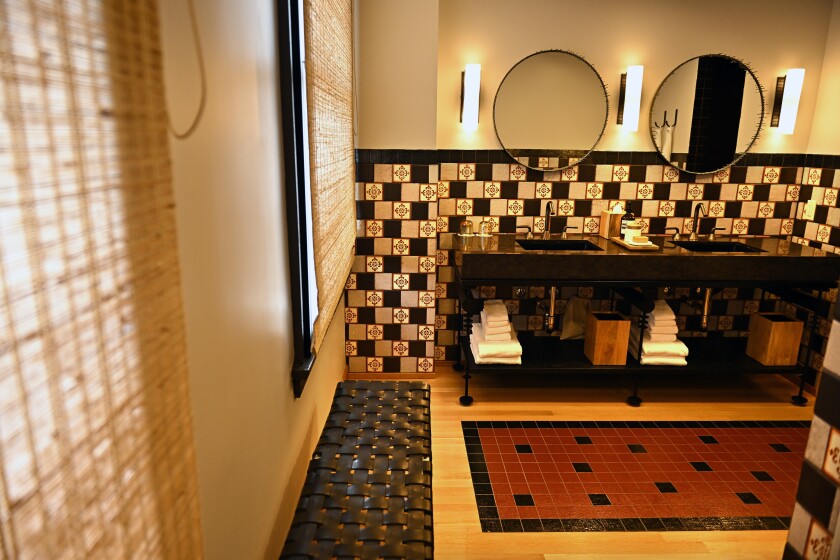
A view of the bathroom in the court suite at Proper Hotel.
(Wally Skalij / Los Angeles Times)
The Proper has two restaurants. Caldo Verde, with Portuguese and Spanish influences, is operated on the ground floor by James Beard Foundation Award winners Caroline Styne and chef Suzanne Goin. The larger restaurant is Cara Cara, serving food and cocktails on the 5,000-square-foot rooftop space where Wearstler created “several little vignettes” to create intimacy among potted plants, trees and succulents.
She tried to keep the furnishings low-profile, she said, to let city views command the most attention.
Rooftop restaurants and bars that look out on city lights can be reliable revenue generators for hotels because they attract locals, reducing dependency on travel patterns, Newport Beach hotel investment banker Donald W. Wise of Turnbull Capital Group said.
Rooms won’t always have guests, he said. “It’s important to embrace the local community so you have a continuing source of patrons.”
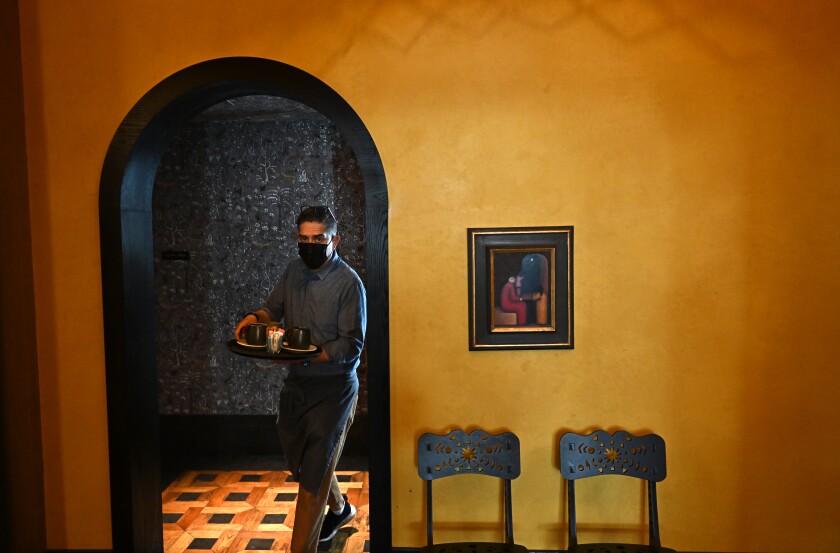
A waiter walks out of the kitchen at the Downtown L.A. Proper Hotel.
(Wally Skalij / Los Angeles Times)
Wise, who is not involved with the hotel, described the downtown Proper as “a long-term play” for the owners because they have a substantial investment to recoup and may need to be patient.
“It’s going to take time for the word to get out, to get a base of customers that returns on a regular basis,” he said.
The high end of the hospitality market “fared pretty well during the black swan event” of the pandemic and is on the mend, especially among coastal and destination resort hotels, he said. City center hotels that counted on business and convention travelers have had a harder go of it.
The NoMad Los Angeles, a high-end boutique hotel in the heart of downtown, closed during the pandemic and remains shuttered even as other businesses, including popular large restaurant Bottega Louie, have reopened.
Paradigm shifts that aren’t fully clear yet have occurred during the pandemic, Wise said, including the way companies will view the necessity for business travel after growing comfortable with meetings on teleconferencing services such as Zoom. Business travel may not return to more than 70% to 80% of pre-pandemic levels when that threat tapers off.
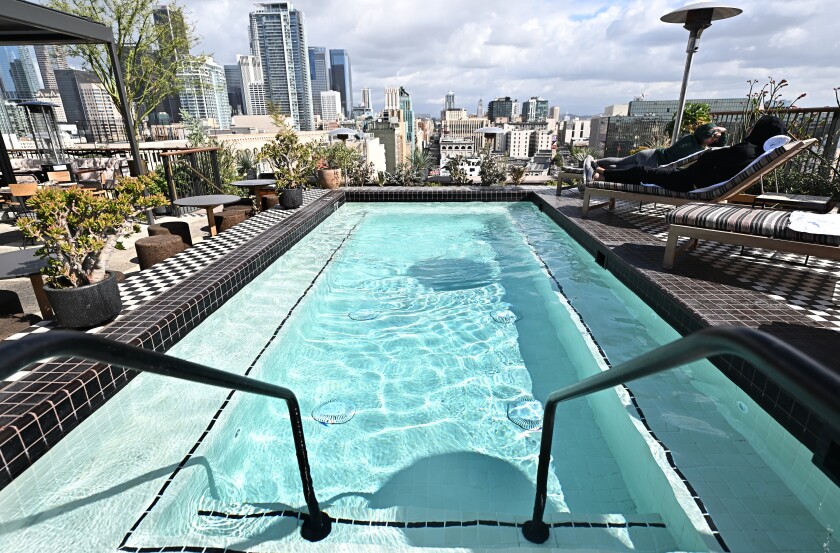
A view of the rooftop at the Downtown L.A. Proper Hotel.
(Wally Skalij / Los Angeles Times)
“The new normal may not be the old normal,” he said, but it will take a few years to find out.
Hotel developers are nevertheless forging ahead with several projects downtown, said Nick Griffin, executive director of the Downtown Center Business Improvement District.
Set to open this year are the Conrad hotel at the $1-billion Grand complex on Bunker Hill, the Cambria Hotel in a renovated 1920s building on Spring Street near City Hall and the 37-story, double-branded Moxie and AC hotel complex with more than 700 rooms by the Convention Center.
An additional 16 hotels are in planning states downtown, including an expansion of the JW Marriott at L.A. Live and a 1,000-room skyscraper across Figueroa Street from the Convention Center, according the Downtown Center Business Improvement District.
The Proper is the latest arrival in the South Broadway area, which was relatively forgotten 15 years ago when downtown was experiencing a renaissance that brought in thousands of new residents, along with restaurants, bars, hotels and offices converted from old industrial buildings.
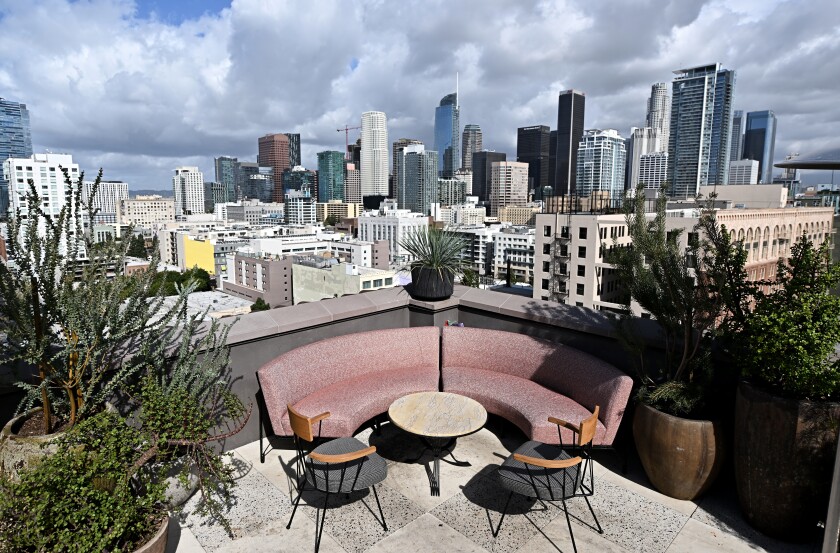
A view of the rooftop at the Downtown L.A. Proper Hotel.
(Wally Skalij / Los Angeles Times)
Economic growth swept into the Proper’s neighborhood in recent years, including the hotels, Herald Examiner Building revival and new stores such as a high-profile Apple store in a renovated movie palace. The nearby California Market Center, a city block-sized office complex that recently underwent a $250-million makeover, has signed large office leases with apparel companies Adidas and Forever 21.
“All of those factors combine to create a dynamic ecosystem,” Griffin said. “We’re seeing that really take hold on South Broadway.”
Downtown has the most dense collection of office buildings in the region, most of which are still sparsely occupied because of the pandemic. Full economic recovery there may depend on what percentage of workers returns to their offices on a regular basis as COVID fears subside.
The average office population in the Los Angeles metro area was 37% at the beginning of March, up from 26.5% as the year began when the Omicron variant was surging, according to Kastle Systems, which provides key-card entry systems used by many companies and tracks patterns of workers’ card swipes.
Business at hotels that Proper manages has also fluctuated with the pandemic, De Lowe said, with dips in revenue in late December and January followed by a more than 30% jump in February.
Average occupancy in Los Angeles area hotels was 67% in the week that ended March 5, up substantially from early last year when occupancy was 40%, according to STR, a global hospitality data and analytics company. Average daily room rates rose from $116 to $184 in the same period.
“We’re feeling super bullish about the spring and the summer,” De Lowe said. “People have been cooped up for so long. Now they want to explore and experience new things, and I think downtown L.A. really offers that.”
